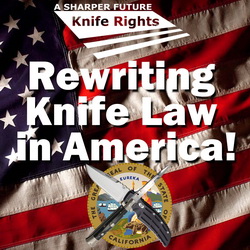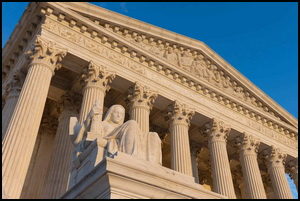
The recent decision by the Supreme Court of the United States in United States v. Rahimi bears on our lawsuit challenging California’s ban on switchblade (automatic) knives with a blade 2-inches and greater on Second Amendment grounds. Plaintiff’s have filed a Notice of Supplemental Authority with the District Court hearing the case.
As you may recall, during our recent hearing, the Court was focused on the baseless argument put forth by the State that in interpreting the plain text of the Second Amendment’s “the right to keep and bear arms,” the term “arms” somehow is limited to only arms “commonly used for self-defense” as opposed to all bearable arms.
Plaintiffs’ attorney, John Dillon, forcefully argued that the “plain text” of the Second Amendment does not say that and in Bruen and Heller the Supreme Court repeatedly stressed that the “plain text” is what matters. Simply put, neither the State nor the Court, can read additional conditions and qualifications into the Second Amendment’s plain text that are not there.
While common sense would seemingly take care of the plain meaning of the term “arms” mentioned in the Second Amendment, the recent decision in the Rahimi case further clarified for those states and courts still struggling with this concept. Among the multitude of instances in the Court’s majority opinion and its concurring opinions in support of reading the Second Amendment as is, not adding any additional made-up layers, was Justice Kavanaugh’s concurring opinion, “[t]he American people established an enduring American Constitution. The first and most important rule in constitutional interpretation is to heed the text—that is, the actual words of the Constitution—and to interpret that text according to its ordinary meaning as originally understood. … As a general matter, the text of the Constitution says what it means and means what it says. And unless and until it is amended, that text controls.”
Justice Kavanaugh provides additional insight, “when the ‘framers of the Constitution employed words in their natural sense; and where they are plain and clear, resort to collateral aids to interpretation is unnecessary and cannot be indulged in to narrow or enlarge the text.'”
Stay tuned for the next installment of Knife Rights Unconstitutional Switchblade Bans Chronicles.
Please support Knife Rights’ lawsuits with a tax-deductible donation to the Knife Rights Foundation at: www.KnifeRights.org/donate (select Knife Rights Foundation)
BACKGROUND

Bruen upheld restrictions on weapons such as machine guns that are deemed by the court to be both “dangerous and unusual.” A weapon that is either not “dangerous” or not “unusual” cannot be prohibited. Automatically opening (“switchblade”) knives and other knife designs and opening mechanisms are neither “unusual,” being legal and common in most places today, nor any more “dangerous” than other non-prohibited knives or weapons. Knife bans existent today do not pass constitutional muster after Bruen.
Bruen also emphasized emphatically from the court’s prior Second Amendment McDonald decision that “the constitutional right to bear arms in public for self-defense is not a second-class right, subject to an entirely different body of rules than the other Bill of Rights guarantees.” Second Amendment decisions by courts must be made on the basis of strict scrutiny, just as with other rights. Intermediate scrutiny or “interest balancing” can no longer be used to decide Second Amendment cases. As such, the government can no longer defend knife bans because government doesn’t like a particular type of knife, for whatever irrational basis it comes up with.
Knife Rights (www.KnifeRights.org) is America’s grassroots knife owners’ organization; leading the fight to Rewrite Knife Law in America™ and forging a Sharper Future for all Americans™. Knife Rights efforts have resulted in 44 bills enacted repealing knife bans in 27 states and over 175 cities and towns since 2010.

